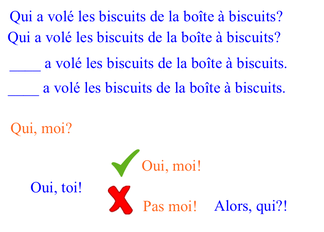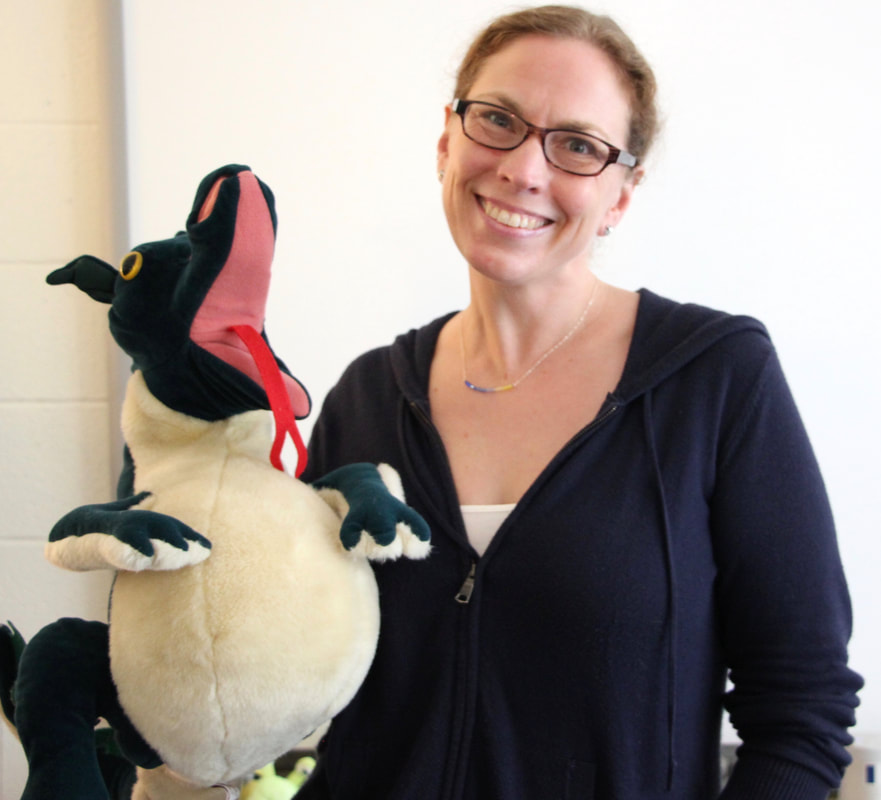|
There is always a lot of sharing of brain breaks in the CI community. I began seriously implementing them about two years ago, and man, are they great! Fun, essential, and community-building. If you haven't visited La Maestra Loca's blog to see her amazing collection, do that now. (Well, as soon as your done reading this post!) One of my students' favorites is a game we call Qui a volé les biscuits de la boîte à biscuits? This is one that can run a little longer than others, but I still love to do it once or twice a month. (It's in the Mafia/Bad Unicorn vein.)
 The basic idea is that students sit in a circle, close their eyes, and place their hands behind their backs. I walk around the circle and place a biscuit (a little fake cookie that a friend baked for me) in the hands of one student; the cookie should be small enough for students to cup it in their clasped hands. I then tell them (in French) to put their hands in front and open their eyes. They then sing the chorus of the song, and students start to guess who they think stole the cookie. On the the left is the slide I show to introduce the song. Click here for a PDF of the Notebook file I use to introduce the vocab in the song. The text of the song in English is
Class: Who stole the cookies from the cookie jar? Who stole the cookies from the cookie jar? Students raise their hands and I choose a someone to name a suspect: Class: _______ stole the cookies from the cookie jar. (The accused's name fills in the blank.) ________ stole the cookies from the cookie jar. Student accused: Who, me? Class: Yes, you! Student accused says either: Yes, me or Not me! If the student isn't guilty, the class says, So, who? We keep playing until the guilty student is found, or I decide we need to stop, in which case students put their hands behind their backs, close their eyes, and I retake the cookie to play again another time (that student will get the cookie a different time). Because I teach younger kids, I have to keep track of who has had the cookie, since everything has to be "fair!" Let me know if you try this, and what you think! Bisous.
3 Comments
I have been thinking so much about these ideas since Brattleboro. During her language lab, Annabelle used a fantastic attention grabber: she would cry hola, hola and her students replied with coca cola. It was extremely effective with both adults and students, and I walked away itching to find something that works as well for me.
With my younger students, I've had a lot of success with a song: "Mains en l'air, sur la tête, aux épaules et en avant, bras croisés, sur les côtés, moulinets, et l'on se taît." I'm not sure where I first heard this, but I did find a video that went well with the song, though I only actually show this video to my super littles, as I think the older ones would think it's baby-ish. (Though, it still works wonders with my fourth graders, who learned it as third graders) I also created a poster with some decent images to accompany the song; email me if you'd like a copy, as I'm still figuring out patents and using images and the like. Anywho, I've been pondering what I could incorporate into my classes, regardless of level. I spent a lot of time talking to folks at the Express Fluency CI conference earlier this month and it started the wheels turning for me. I was striving to find something that would be culturally relevant, linguistically appropriate, and catchy, all at the same time. It made me think of a moment I had a couple of years ago when I was trying to connect with some locals during a summer in France. (Thanks, Tinder!) My friend Romain said during one of our conversations, "T'es sûre que tu n'es pas française?!" ("Are you sure you're not French?!") I was flattered to think that I had the ability to make a French person say, "Whoa, just how good is this American girl's French?!" So...I thought maybe I could use this to my advantage in my classroom and incorporate some common expressions as attention grabbers for my older kids. I wanted something where the teacher could say the first part, and the students could respond with the second. (In my examples below, the teacher's call is red and student response is blue.) The two expressions that really caught Romain's eyes were Allons-y/Alonzo, an expression from a Godard film that apparently made its way into Doctor Who! I also love, C'est cool/Raoul. (One could also substitute ma poule for Raoul.) After digging around a bit online, I found some other fun possibilities involving names that have cultural significance. En voiture/Simone A l'aise/Blaise Tranquille/Émile A la tienne/Etienne Check out the bottom of this post for a whole list of other possibilities! Then came the challenge of finding a great phrase for a Brain Break to mirror Annabelle's Chocolate hand game (she explains it, with photos, here on her blog). There aren't many four syllable French words, so I turned to expressions. Here are some possible ideas: aller-retour camionette boîte à conserves pâtisserie or boulangerie What other attention grabbers or French-specific Brain Breaks do you have? Please share! Bisous. After playing around with the idiomatic expressions with names that I listed above, I moved on to general expressions that I though could transfer to the classroom. Here is what I came up with: qui plus sait/plus se tait (I like this one because of the meaning behind it!) mon petit/chou c'est du/gâteau crème de la/crême à toutes/jambes après la pluie/le beau temps occupe-toi/de tes oignons vouloir/c'est pouvoir laisser les bons temps/rouler chose promise/chose due le temps/c'est de l'argent pas de nouvelle/bonnes nouvelle petit à petit/l'oiseau fait son nid quand le chat n'est pas là/les souris dansent qui va à la chasse/perd sa place plus on est de fous/plus on rit qui se ressemble/s'assemble tel père/tel fils on est tous/dans le même bain un sou/est un sou l'erreur/est humaine (or, divided differently, l'erreur est/humaine) l'union fait/la force (or, divided differently, l'union/fait la force) quelle/salade (I'm not sure how I feel about this one, I think the fact that the teacher's call is only one syllable could be challenging.) These expressions could also be used as passwords à la Bryce Hedstrom, and incorporated into class in a plethora of ways. |
AuthorAllison Litten, the 2019 VFLA TOY, teaches French at the Marion Cross School, a public PreK-6 school in Norwich, Vermont. This is her twenty-third year teaching, and twentieth at Marion Cross. Archives
May 2023
Categories
All
|


 RSS Feed
RSS Feed
